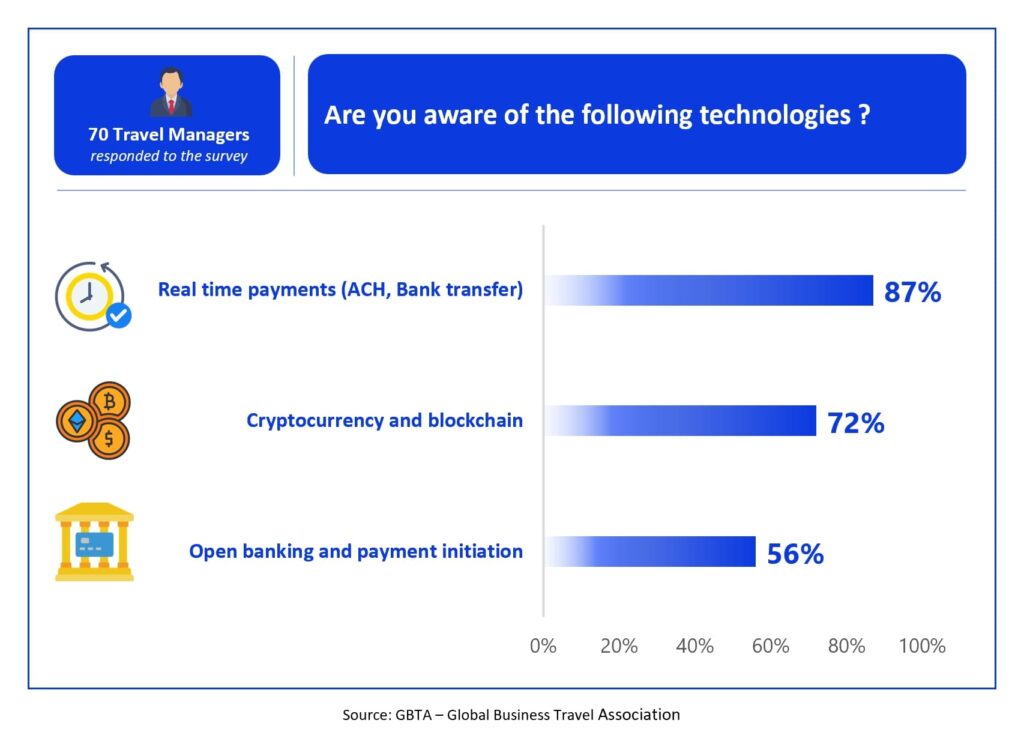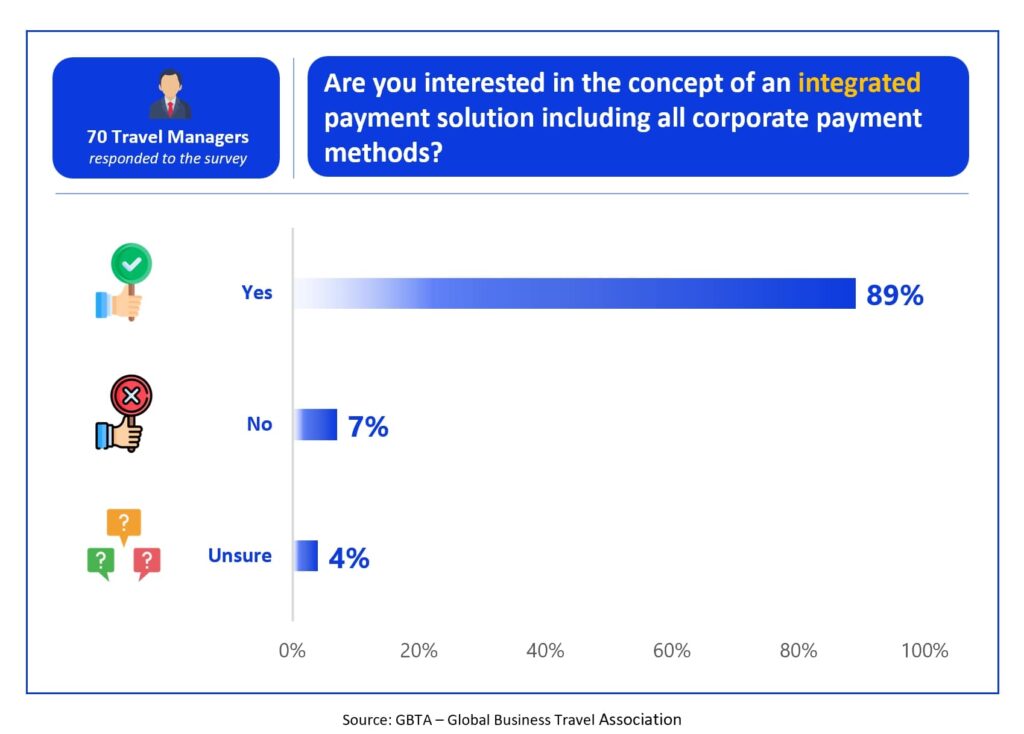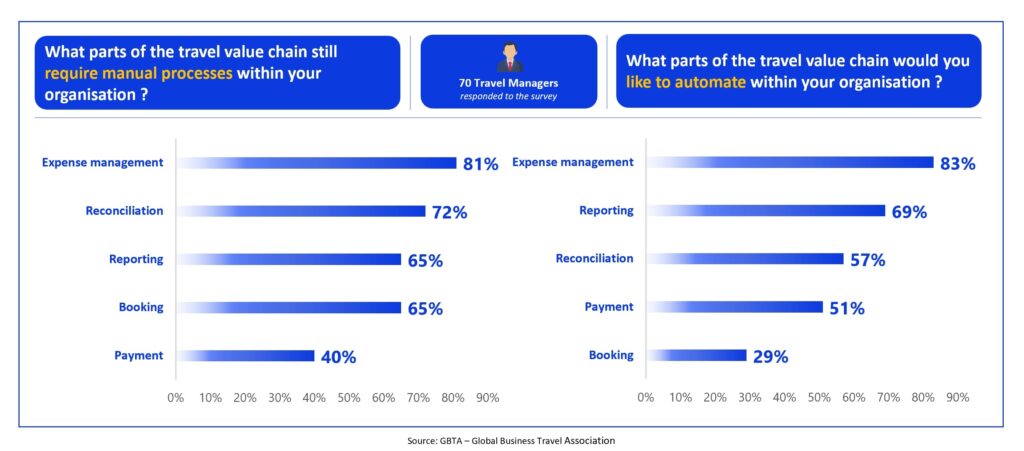
By Greg Toussaint – Director, Edgar, Dunn and Company
When it comes to creating a successful corporate travel payments strategy, staying up to date on emerging trends and streamlining your payments processes are critical.
In our last blog, we covered which payment methods can help you reduce friction points and create a streamlined payment process. Once your payment methods are in check, it’s time to stay on track with payment-related trends and integrate your payments with your existing systems.
Follow payment-related trends to be prepared for the future
Travel payments is a fast-evolving industry with many innovations and new technologies constantly emerging. If you don’t keep up with how the payments landscape is changing, your program could fall behind, costing you lots of money.
During a recent GBTA session, we presented this topic to a group of 70 travel buyers and conducted a poll to see how many were aware of new payment-related innovation/technologies. The results revealed that:
- 87% were aware of real-time payments made by ACH / bank transfer
- 72% were aware of cryptos and blockchain technology
- and only 56% understood open banking and payment initiation

Today, travel is very much a card-centric sector, where diverse functionalities can be leveraged to make payments, from booking without immediate payment (e.g. for hotel or car rental bookings) to delayed payment after service (e.g. hotel meals or internet paid after hotel checkout). However, this could be challenged in the future as the adoption of these new technologies may emerge into the travel landscape:
- Payments in real-time: ACH/bank transfer rails are fast developing across the globe. Payment immediacy and payment guarantee are features that could be relevant for travel, such as gaining immediate access to travel tickets.
- Open banking with payment initiation: This provides the ability to initiate a payment (e.g. bank transfer) from a different entity than its financial institution. This could be the case for instance when making payments through travel intermediaries. Using open banking would help you avoid having to share credit card payment details with your TMC. Payment initiation coupled with real-time payments could prove to be an alternative to card payments in the future.
- Cryptocurrency: Cryptos are currently in a crypto winter due to the lack of regulations and bankruptcies of main actors. As the crypto industry recovers and becomes increasingly regulated, specific use cases will emerge where blockchain technology may prove to be relevant to travel, providing more payment transparency especially in complex bookings with different parties involved.
Overall, even if new technologies emerge, it is safe to say there will be no revolution in the short-term and payment cards will still be very much in use in corporate travel. However, as innovation makes its way into the travel sector, it’s important to stay ahead of the curve and regularly assess the impacts of new payment trends on your corporate travel payments strategy.
Integrate payments with existing systems to achieve greater efficiency
Essentially, every step of the travel process requires payment of some sort, and in many cases the payment process can be just as important as the payment itself. If payments are not integrated to current systems used by your travel program, you’re faced with manual processes and inefficiencies across the organization.
When asked which parts of the travel value chain still required manual processes, travel managers indicated the following:
- 81% for expense management
- 72% for reconciliation
- 65% for reporting
- 65% for booking
- 40% for payments
And these same travel managers indicated that they would like to see the most manual processes become automated.
Luckily, in recent years, payment providers have started focusing on integrating payments with other systems in the travel value chain such as prefilling an expense report with corporate card transaction data, or the ability to use mobile apps to manage travel expenses. A recent survey of 164 travel buyers worldwide conducted by BCD Travel revealed that while nearly 7 out of 10 buyers offer mobile apps of their Expense Management Systems (EMSs), only half of them reported integrating payment data into expense systems.
Developing an integrated payment solution
For travel managers, it can become complicated to understand which payment methods are most appropriate for different types of travel expenses. And one could argue that this should not be expected from travel managers, but rather be facilitated by issuers who could develop an integrated payment solution.
So, what could an ideal integrated payment solution look like?
- Including all payment methods used by corporations for corporate travel (e.g. lodge account, plastic corporate cards, different types of virtual cards)
- Prioritizing the use of specific payment methods depending on priorities (e.g. increase financial rebates, decrease costs, generate greater efficiency) and types of travel bookings (e.g. air, hotel, car rental, train, other expenses)
This would result in simplifying the complexity of corporate payments for corporations, with the integrated payment solution suggesting the most relevant payment method depending on the type of spend.

A vast majority of travel managers (89%) expressed their interest in the concept of an integration payment solution managing all corporate payment methods. They also highly perceived the benefits of an integrated payment solution including:
- Consolidated reporting of all corporate travel payments (89%)
- Increased internal efficiency (78%)
- Automation of payments (69%)
- Easier use of different payment methods (53%)
Overall, this concept of an integrated payment solution is clearly of great interest to travel managers and can play a key role in achieving greater efficiency across your travel program. Plus, beyond increasing efficiency within their travel program, travel managers should inquire how their payments strategy can support their internal operations be it for expense, reporting, reconciliation, payment or booking purposes.
Want to learn more about how to future-proof your payments strategy? Contact our team today!

